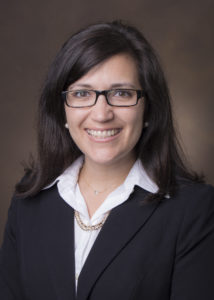Alumni Profile: Britney Grayson, M.D., Ph.D. (’12)
by J-N Gallant (M4)
 Britney Grayson was born in Noble, a single stoplight town 15 minutes south of Norman, Oklahoma. She grew up on both sides of the Red River before enrolling at (The University of) Tulsa for her undergraduate studies. One of the driving factors behind her choice for college was a desire to be close to home; to be close to a mother sick with systemic lupus erythematosus (‘lupus’; SLE). Her mother and illness would play a key role in Britney’s journey in medicine and science. Motivated by an interest in SLE and corresponding medical research, Britney hit the ground running, starting to work in a lab during her freshman year at Tulsa. She spent ensuing summers in the lab, including at other institutions, such as Baylor, solidifying an uncompromising interest in medicine and science. As opposed to many, she “saw the worth in failed experiments,” enthusiastically learned from her mistakes, and enjoyed the stepwise progression of science. This grit and passion for research made her one of the top students at Tulsa and enabled her to continue her studies, uninterrupted, by joining in the Vanderbilt MSTP in 2004.
Britney Grayson was born in Noble, a single stoplight town 15 minutes south of Norman, Oklahoma. She grew up on both sides of the Red River before enrolling at (The University of) Tulsa for her undergraduate studies. One of the driving factors behind her choice for college was a desire to be close to home; to be close to a mother sick with systemic lupus erythematosus (‘lupus’; SLE). Her mother and illness would play a key role in Britney’s journey in medicine and science. Motivated by an interest in SLE and corresponding medical research, Britney hit the ground running, starting to work in a lab during her freshman year at Tulsa. She spent ensuing summers in the lab, including at other institutions, such as Baylor, solidifying an uncompromising interest in medicine and science. As opposed to many, she “saw the worth in failed experiments,” enthusiastically learned from her mistakes, and enjoyed the stepwise progression of science. This grit and passion for research made her one of the top students at Tulsa and enabled her to continue her studies, uninterrupted, by joining in the Vanderbilt MSTP in 2004.
Partly due to her interest in (her mother’s) SLE, Britney joined the Vanderbilt MSTP wanting to be a rheumatologist. She completed her graduate studies in Thomas Aune’s laboratory, studying the genetics of autoimmune disease. She excelled and was setting herself up for success as a traditional physician scientist—applying for grants, shadowing rheumatologists, meeting with Nancy Brown, etc.—until she returned to clinical training in medical school and encountered the surgery clerkship. Dr. Grayson was “shocked” that she liked surgery. Perhaps as a result of growing up alongside chronic medical disease, she enjoyed “taking disease out in a day.” She found immense satisfaction while in the operating room and realized that days went by very quickly while scrubbed into cases. Additional surgical exposure in the surgical ICU and on the trauma service led her to pursue a residency in general surgery.
Dr. Grayson recently completed her residency in general surgery at Vanderbilt and is now finishing her pediatric surgery fellowship at Riley Hospital for Children at Indiana University Health—where she’ll join the faculty as a pediatric surgeon later this year. While she’ll be on faculty at Riley, she will only spend a few weeks in the United States every year. Most of her time will be spent abroad, in Kenya, at Kijabe Hospital, where she will help lead one of the only pediatric surgery fellowship programs in the entire African continent. This is a dream job for Dr. Grayson, one she “did not think was possible, but that was everything that she wanted.”
Her road to this current position was not so obvious during her surgical training because “every year something completely changes.” After finishing the MSTP, Britney thought about being a transplant surgeon (weaving in her immunology training) or even a surgical oncologist (she really likes abdominal surgery), but a few key events (in retrospect) lined up to lead her to a position at Kijabe. During residency, Dr. Grayson’s mother passed away, loosening her attachments to this country. She also found and nurtured a love for teaching—whether it be fellows, residents, or medical students. Lastly, she pursued a fellowship at an institution that encouraged international medicine via its strong global health connections. Her background and training in the MSTP always had Dr. Grayson steering towards an academic career, but it wasn’t until these events took place that she saw what such a career could look like.
Seeing these possibilities, prospectively, is difficult for trainees. As such, Dr. Grayson says that “the biggest advice I can give [trainees] is just to trust your gut—even if [the situation is] completely different than what you’ve been planning for your whole life.” Dr. Grayson will readily admit that it may have been more straightforward to pursue a career as a physician-scientist in rheumatology; but, that she would readily repeat her training path. “Having a PhD as a surgeon is a great advantage,” helping one to be a more robust and thorough physician and to learn to succeed despite failure. She encourages trainees to trust the process and let life happen.
